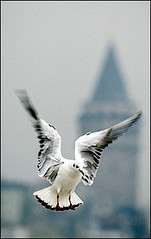Al-Qaeda chief dies in missile air strike
The death of a senior militant in a controversial hit has led to claims of the terror group's defeat
Jason Burke
The Observer,
Sunday June 1 2008
An al-Qaeda trainer and explosives specialist involved in a range of European terrorist networks has been killed in Pakistan, the latest senior militant to die in a spate of controversial American missile strikes.
The death two weeks ago of Abu Suleiman al-Jazairi, a highly experienced Algerian militant, has been confirmed only in the last few days, intelligence sources in Pakistan and Western Europe told The Observer.
Al-Jazairi, thought to have been 45, died along with at least 15 others when the house in which he was staying in Pakistan's Bajaur tribal district was hit by a missile fired from a Predator, an American pilotless drone.
Details are only now emerging about the strike on Damadola, a village near the Afghan-Pakistan border hit twice in the past. The house targeted and destroyed by the drone is believed to belong to a former Afghan Taliban defence minister, Maulvi Obaidullah, members of whose family, including women and children, are thought to have died.
The surrounding area is in the hands of militants linked to the Pakistan Taliban militant group who have been blamed for the killing of Benazir Bhutto last year.
The death of al-Jazairi, thought to have been director of external operations for al-Qaeda and thus responsible for running the terrorist group's European and British networks, was cited by CIA chief Michael Hayden last week as one of the reasons for the 'strategic defeat' of al-Qaeda.
Another top militant, Abu Laith al-Libi, was killed in February.
'The ability to kill and capture key members of al-Qaeda continues, and keeps them off balance - even in their best safe haven along the Afghanistan-Pakistan border,' Hayden said.
Hayden added that al-Qaeda had been defeated in Saudi Arabia, was losing the battle for hearts and minds in the Islamic world and was now unable to exploit the Iraq war to draw in new recruits.
However, the CIA chief's upbeat assessment contrasts with collective thinking in the intelligence community in America and elsewhere.
Senior counter-terrorist officials in Europe, the Middle East and South Asia in recent weeks revealed profound concern about the potential use of weapons of mass destruction by militants and the continued attraction of the al-Qaeda ideology for second or third generation immigrants and converts in the West.
Britain, with its close links to Pakistan, is in a particularly vulnerable position.
'It is certain that mainstream hardcore al-Qaeda have suffered considerable setbacks - in Iraq certainly and elsewhere - but I think generally there is a lot more caution,' said Nigel Inkster, recently retired deputy head of MI6.
'It would only take a couple of attacks for the positive perception to radically change.'
Bruce Hoffman, terrorism expert at Georgetown University, said Hayden's comments needed to be seen in the context of American domestic politics.
'In an election year with a two term administration that is very sensitive to its historical record this is not unexpected,' he told The Observer.
'Al-Qaeda may not have had a successful attack in three years but it is too early to declare victory.'
Hoffman said that the danger this year was in fact high. 'People do not join a terrorist group to sit on their hands and if [al-Qaeda] are going to retain their relevance it is now or never.'
Yet senior figures within American intelligence have also been struck by the failure of al-Qaeda to mobilise broad support in the Islamic world, and have begun to think more optimistically about the future.
Security services have closely followed disputes and defections in recent months.
Vicious feuding has led some analysts to conclude that the Islamic militant movement is turning in on itself with al-Qaeda leaders Bin Laden and Ayman al-Zawahiri increasingly isolated.
Postings by al-Zawahiri in a question and answer session on the internet a month ago had a defensive tone, seeking to justify civilian casualties in militant attacks. The strategy is seen as a failure by many militants outside al-Qaeda and by some within the group.
Alan note: a fly in the ointment comes from Iran's recent high level talks, in Iran, with Al Qaeda senior members they have sheltered/kept on ice for eventual use/barter inside Iran, including a couple of Bin Laden's sons.
Reports in the past have indicated one of the sons, who had lived in high style in Northern Iran, Caspian Sea region, was sent to Syria to help out with Al Qaeda activities there. Possibly in the villa shown below.
RASHT VACATION HOME click here
This article appeared in the Observer on Sunday June 01 2008 on p33 of the World news section. It was last updated at 00:00 on June 01 2008.
Subscribe to:
Post Comments (Atom)





No comments:
Post a Comment